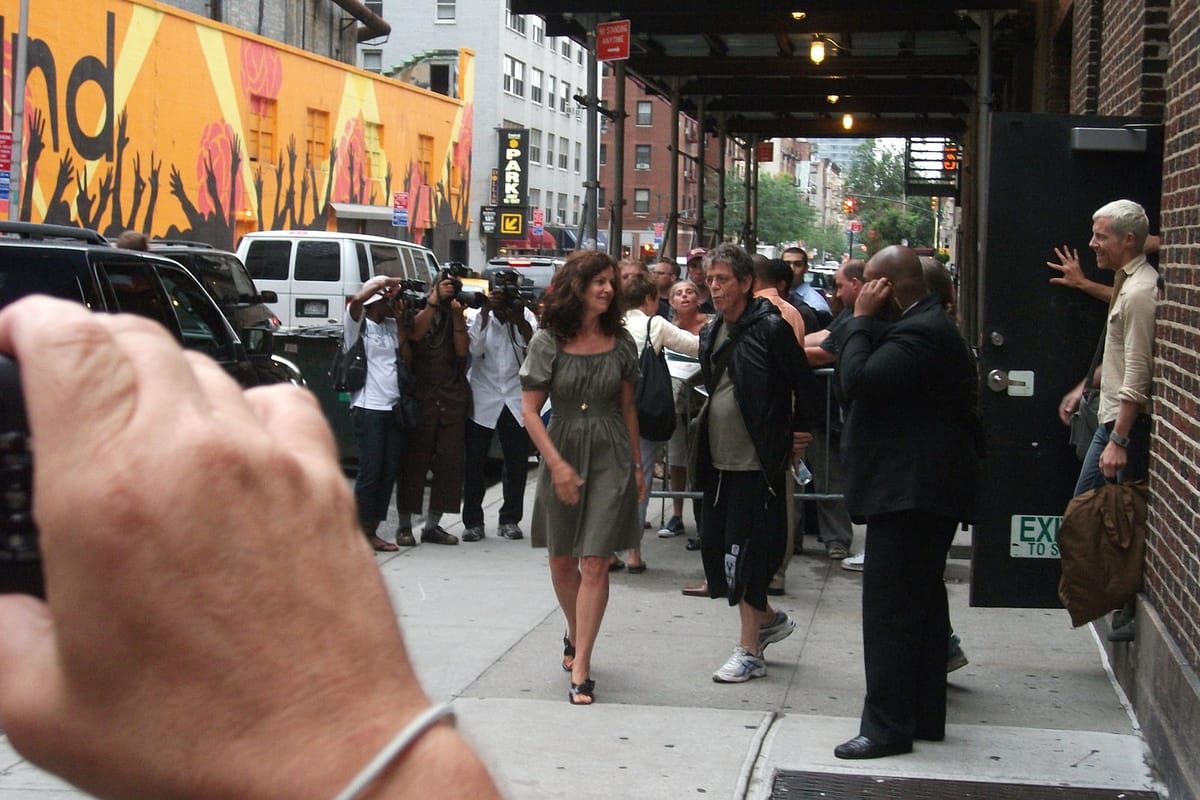The Canonization of Lou Reed
Jeremy Lybarger at The New Republic

There were at least three Lou Reeds. First and most enduring was the front man of the Velvet Underground, the greaser poet from Long Island who had a cabbie’s voice and a knack for writing songs about drugs and sex and salvation that sounded like the gutter side of 1960s rock. Then came Reed the freelance auteur, churning out spotty solo albums and delivering gnomic anti-interviews to the press. (This same Reed licensed songs to The Simpsons and Beverly Hills 90210, and appeared in ads for American Express.) Then, beginning in the 1990s, there was Reed the patron saint of downtown New York, as much an acknowledgment of the city’s millennial sterility as a tribute to Reed’s genius.
The three versions had an uneasy coexistence, as indicated by Reed’s famously volatile temperament. He could berate anyone—“you’re a fucking moron,” he once barked at a 22-year-old interviewer—but he could also charm a room. Making sense of Reed’s multitudes, and cutting through the mythology that enshrined him as some kind of junkie savant, is the task Will Hermes sets himself in Lou Reed: The King of New York. “If you’re hoping for some neat totalizing statement or psychological profile to explain Reed, to fix him like a butterfly specimen, you won’t find it here,” Hermes cautions early, conceding from the outset the foolhardiness of synthesizing such an unruly artist. And yet the biography, all 560 pages, presents a Reed ravenous for adoration: from his mentor, the boozehound writer Delmore Schwartz; from his onetime manager and muse, Andy Warhol; and from an ensemble of star-crossed lovers, confidants, and rivals. Not a psychological profile, then, but surely a window into sentimental Reed lyrics like “the glory of love might see you through.”
Because Reed’s life overlaps with the development of rock and roll, Hermes’s book is also a cultural history of the genre. The first single Reed ever bought, “The Fat Man” by Fats Domino, released in 1949, is considered one of the earliest rock records. (There’s a distant echo of that song’s “wah wah wah” chorus in the “doo do doo” refrain on Reed’s “Walk on the Wild Side” from 1972.) As the decades progress in Hermes’s book, the various milieus Reed inhabited flash by like tinseled mile markers. There’s the underground ferment of Jack Smith, Jonas Mekas, Barbara Rubin, and the New York School poets. There’s CBGB and Max’s Kansas City. There’s the punk upstarts Patti Smith, Television, and Talking Heads. There’s the extraterrestrial David Bowie. There’s Metallica, regrettably. By the final page, Hermes has traced rock’s trajectory from teenage talisman to corporate cash cow to something approaching monumentality: the soundtrack of what used to be called the American Century.
As the book’s subtitle indicates, Reed was also a divining rod for New York, tracking and manifesting the city’s raw energies. One subtext—which Hermes mostly avoids—is the evaporation of New York’s counterculture in the wake of tangled -tions and -isms: gentrification, corporatization, conglomeration, rank careerism, and the ne plus ultra, the internet. Reed’s career arguably parallels the city’s ruthless professionalization—a cultural mode that shifted its calculus from DIY to ROI, from collectivity to the singular. A hefty biography of Lou Reed is well-timed for an audience now slouching toward Medicare, and their offspring, all basking in nostalgia. He’s a taste of something—leather, maybe—plausibly more authentic than anything in the air these days.
Lewis Allan Reed was born in 1942. His father was a certified public accountant who later became treasurer of a company that manufactured potato chip bags. His mother was a homemaker so pretty she’d once been crowned “Queen of the Stenographers of NYC.” The family lived on the South Shore of Long Island, in the village of Freeport—“the most boring place on earth,” according to Reed— where the local celebrity was “Mr. New Year’s Eve”: the mawkish bandleader Guy Lombardo.
Reed put together his first band as a junior in high school, initially with the ambition of performing a Little Richard tribute act in the school’s annual variety show. A neighbor in the audience was so impressed that he introduced the boys to a rep from the fledgling Time Records. The Shades, as the trio was christened, recorded their debut single in the summer of 1958, with Reed on guitar and backing vocals. “We’d open supermarkets, shopping centers, things like that. We had glitter jackets,” recalls one of Reed’s bandmates. Although the record deal ended there, it encouraged Reed enough that he continued to play music and even assembled a new band, the Valets (their business card read HERE TO SERVE YOU AND YOURS). Reed handpicked all the covers: songs by Ray Charles, the Cadillacs, and the Isley Brothers, among others.



